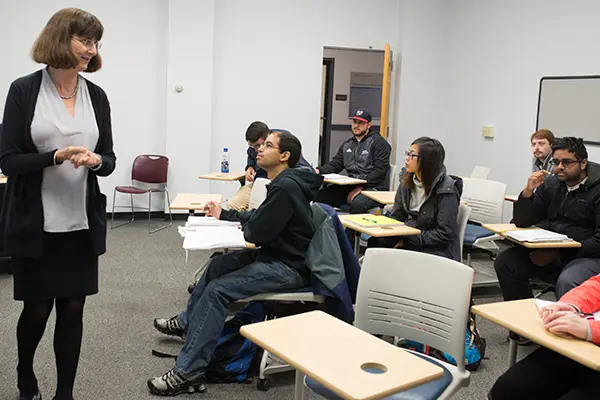Study Says Economics is Racially and Ethnically Diverse – But More Women are Needed
 Image by Courtesy
Image by Courtesy
07/31/2020
By Katharine Webster
Students liken the Economics Department to a family: It’s close-knit, everyone knows each other, and the professors are accessible and welcoming.
“The small department and the intimacy that I have with the economics professors, with one-on-one time, speaking to them outside of class and getting their help in really understanding the material, are the biggest reasons I decided to major in economics,” says rising senior Marvens Francois.
UMass Lowell’s economics majors are also more racially and ethnically diverse than in 99 percent of undergraduate economics departments in the U.S., according to the Federal Reserve Bank of New York’s Economics Education Inclusion Index – a fact of which the department is proud, says Chairwoman Monica Galizzi. However, like all economics departments nationwide, UML’s hopes to recruit more women, she says.
 Image by Tory Wesnofske
Image by Tory Wesnofske
One reason for the lack of diversity among economics majors nationally is that few students have an opportunity to take an economics class in high school – and those who do generally come from higher-income, predominantly white communities, Galizzi says.
Economics majors in the College of Fine Arts, Humanities and Social Sciences, by contrast, usually start in other majors and discover the field after they take microeconomics, which is required for all business students during their first semester and highly recommended as a social science class for engineering students.
That’s how Francois, originally an electrical engineering major, got hooked. He ended up joining the Economics Society and its Federal Reserve Challenge team, and he now has an internship in financial management with the U.S. Air Force Civilian Service that’s preparing him for a job after graduation.
 Image by Courtesy
Image by Courtesy
“I’ve always had this love for economic theory and the stock market and things like that, so I said, ‘I’ll give it a try’ – and I’ve never looked back,” he says. “It’s definitely one of the best decisions I made in my life.”
Likewise, Olivia Cheung ’20, who started at UMass Lowell as a biomedical engineering major, ended up double-majoring in economics after taking microeconomics. Despite a crazy course load, she managed to study economics abroad twice – once in Germany and once in Japan, where she became passionate about the economics of poverty and development.
Cheung, who is also an Honors College graduate, is about to start on her master’s degree in economics at Tufts University, where she was admitted with a significant tuition scholarship and a teaching assistantship.
“Rather than going into the biomedical industry and making small waves, I feel like I can make a difference in economics,” Cheung says.
 Image by Courtesy
Image by Courtesy
Christian Lutete ’19 ’20, captain of the River Hawks’ Division I men’s basketball team this past season and America East Man of the Year, says he struggled to balance his basketball schedule with his major in computer science, so he switched to economics – and went on to complete a master’s degree in Peace and Conflict Studies, also at UMass Lowell.
“I really liked my economics teachers and my classmates. They were all so supportive of me,” he says. “They’d come to my games, and when you see your classmates and your teachers being so supportive of you, it just makes you want to work even harder in the classroom.”
Galizzi notes that the department’s faculty is becoming more diverse, too, which benefits students academically: In the classroom, some professors address how racial, gender and cultural differences affect economic status and shape the economic choices that people make, she says.
The diversity of the students, including quite a few international students, leads to interesting discussions, says Rachel Jordan, a rising senior and Honors College student who has a paid summer internship with Liberty Mutual Insurance in Boston. Jordan also studied abroad in Germany, with Cheung, and is a leader on the Federal Reserve Challenge team.
 Image by Courtesy
Image by Courtesy
“You get different perspectives on things, especially when you work in a team setting,” she says.
Jordan did take economics in high school. She says she came to UMass Lowell in large part because Galizzi heads the Economics Department. She was even more excited about studying here after she met Galizzi in person at an event for accepted students.
“She made a lasting impression on me,” Jordan says. “She said she would be happy to answer any questions I had about the department and help me to choose a school, even if it ended up not being UMass Lowell, because there are so few women going into economics.”
Now, the department is tackling gender equity head-on, because women bring a different perspective to economic issues, Galizzi says. Last year, the department hired another woman into a tenure-track position: Asst. Prof. Kelly Hellman, who immediately started a Women in Economics student club with Galizzi. Jordan and Cheung both joined, and enjoyed sharing experiences and socializing.
 Image by Courtesy
Image by Courtesy
Giulia Rabbito, a women’s soccer player who started out majoring in business and migrated to economics, went to some of the group’s events when she wasn’t at practice. Rabbito says that she and a friend, Clara Defourt, a field hockey player from Belgium, are often the only two women in their upper-level economics classes.
Her pitch to first- and second-year women students in business and other related fields? They should seriously consider majoring or minoring in economics.
“Economics is a male-dominated major that needs more women in it,” she says. “The professors in economics are absolutely amazing, and they’ll connect you with people, even after graduation.”




